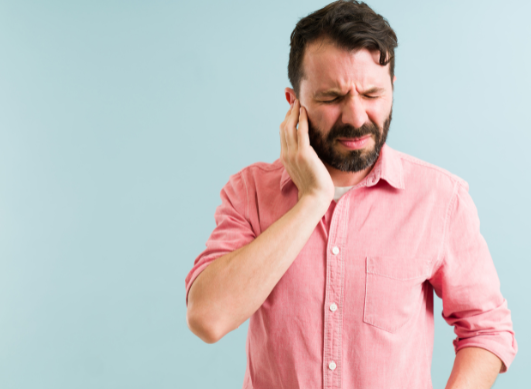Everything there is to know about tinnitus!
Published Feb 11, 2024 • By Candice Salomé
Tinnitus is hearing noise (buzzing, whistling, crackling, etc.), generated spontaneously in the auditory pathway and not caused by any external sound.
So where does tinnitus come from? What are its symptoms and causes? Can tinnitus be treated?
We explain it all in our article!

What is tinnitus?
It is estimated that 10% to 18% of the population is affected by tinnitus, either permanently or occasionally. Around 2% of them suffer from "serious" tinnitus, meaning that it can significantly affect their quality of life (difficulty falling asleep or concentrating, stress, anxiety and even depression).
Tinnitus is an auditory sensation perceived in the ear or head that is not caused by an external sound.
Tinnitus can take different forms and varies in intensity from person to person. The noises you may hear include:
- buzzing,
- squeaking,
- whistling,
- ringing,
- hissing,
- whirring,
- clicking, etc.
Tinnitus can be heard in one ear only (unilateral) or in both ears (bilateral). It may be present continuously or intermittently, transiently or persistently.
Tinnitus is said to be acute when it is recent and present for several hours a day. It is called "chronic" when it persists for more than three months.
There is nothing abnormal about tinnitus from time to time, particularly when there is silence around you. It is only when it recurs that you should seek medical advice.
There are two types of tinnitus:
- Objective tinnitus: it is rare and accounts for only 5% of cases. People who develop objective tinnitus, hear noises from an organ in their own body. For example, it could be the sound of blood circulating in a vessel in their neck or head. An outsider could also hear it. In these cases, the cause should be sought, as treatment is often possible;
- Subjective tinnitus: it accounts for 95% of all cases of tinnitus. In this case it is associated with an ear disease and is only perceived by the patient.
What causes tinnitus?
Most cases of tinnitus have neurosensory origins and result from abnormalities in the functioning of the auditory pathway. It can occur at several levels: from the periphery (the ear) to the cortex.
Generally, these abnormalities are lesions or malfunctions of the inner ear or auditory nerve fibers. In around 80% of cases, tinnitus is associated with hearing loss. No deficit may be found on the audiogram, but undetectable damage to auditory nerve fibers cannot be ruled out.
Sometimes tinnitus can be associated with hyperacusis (increased sensitivity to sound).
Tinnitus is often the result of:
- Repeated acoustic trauma (listening to music at very high volume, having a job where you are exposed to loud noises, etc.),
- A normal decline in hearing linked to ageing.
It can also be caused by a condition of the auditory system such as:
- An earwax plug, or a foreign body in the ear, which is often accompanied by reduced hearing,
- Inflammation of the ear or acute otitis media (AOM), which develops in a small bony cavity behind the eardrum,
- Otosclerosis - an abnormal bone growth in the middle ear which causes the ear to malfunction and can lead to deafness,
- Meniere's disease,
- Damage to the auditory nerve or the inner ear.
How can tinnitus be treated?
Tinnitus is not a disease, and to date there is no cure. Nevertheless, it is essential to see an ENT specialist, who will carry out a hearing assessment to identify the cause of tinnitus and offer a suitable treatment.
Hearing aids can help people affected by tinnitus perceive their environment more clearly, and thus mask the phantom noise.
Sound therapy can also be considered. It is a hearing aid that emits moderate background noise (white noise) and masks tinnitus by limiting its perception.
Today, new alternative approaches are being used to limit the impact of tinnitus on peoples' daily lives. This is the case with CBT (behavioral and cognitive therapy), which aims at controlling negative thoughts to help patients better cope with tinnitus.
Certain relaxation techniques can also help, such as hypnosis, sophrology and mindfulness. These techniques allow patients to let go of the symptoms associated with tinnitus.
If tinnitus is accompanied by anxiety, medication such as anxiolytics may be recommended on an occasional basis.
Share your thoughts and questions with the community in the comments below!
Take care!
1 comment
You will also like

What are the dangers associated with the over-the-counter sale of certain medicines?
Dec 19, 2020 • 6 comments

 Facebook
Facebook Twitter
Twitter


